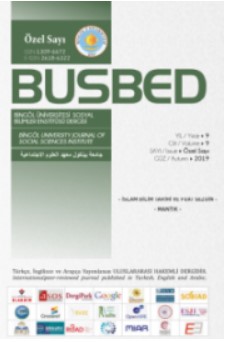FUAT SEZGİN’İN ENDÜLÜS ARAP ŞİİRİYLE İLGİLİ MÜLAHAZALARI
FUAT SEZGİN'S THOUGHTS ON ENDULUS ARABIC POETRY
Author(s): Halil AkçaySubject(s): Islam studies, Other Language Literature, 6th to 12th Centuries, Theory of Literature
Published by: Bingöl Üniversitesi Sosyal Bilimler Enstitüsü
Keywords: Andalusia Arabic Poetry; Fuat Sezgin; GAS; Muwashah; Zajal;
Summary/Abstract: Andalusia, which serves as an important bridge for the transportation of the Islamic civilization to Europe, was a follower of the East in the scientific and cultural spheres in the first centuries after its foundation. This is the case in literary studies, too. However, the Andalusian literature has been enriched as a result of the common culture of different elements such as religion, language and race that live together on its lands and from the beginning of the 11th century AC it started to give original products. After capturing a high intellectual level, Andalusian literature reached a level that influenced Western literature, especially Spain and France, with its unique “muwashah” and “zajal” poems. With all these features, Andalusian poetry attracted the attention of Arabic literature historians. In this context, Fuat Sezgin's study on Andalusian poetry were examined as a historian of science and its considerations on the subject in order to be of importance in this context. The main source of our study is Fuat Sezgin's masterpiece Geschichte des arabischen Schrifttums (GAS) which covers Arabic poetry extensively. In this study, Fuat Sezgin's view of science and history of science and the importance he gave to Andalusia are discussed and brief information is given about GAS. In addition, Fuat Sezgin's way of taking Andalusian Arabic poetry and his evaluations on the subject and the boundaries he draws on the subject and the different approaches to the subject are explained.
Journal: Bingöl Üniversitesi Sosyal Bilimler Enstitüsü Dergisi (BUSBED)
- Issue Year: 9/2019
- Issue No: Sp. Issue
- Page Range: 61-76
- Page Count: 16
- Language: Turkish

